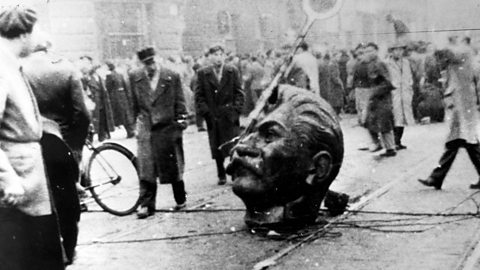The Hungarian Uprising, 1956
In 1956, Soviet tanks invaded Hungary - a country that was already under its control. The Hungarian people took to the streets and to fight the Soviet Red ArmyArmy of the USSR..
Why was communist rule unpopular?
- The Hungarian leader, Matyas Rakosi, was a hard-line communistSupporters of the communist movement or party. fully under the control of Moscow.
- Hungarians had no freedom of speech.
- RakosiÔÇÖs secret police (the AVH) created a climate of fear, arresting anyone who spoke out or opposed communist rule. Even something as simple as listening to Western music could lead to arrest.
- Thousands of Soviet troops and officials were stationed in Hungary, which the Hungarian people were forced to pay for, creating poverty.
- The Russian language was being forced upon the people - with Hungarian street signs being replaced with Russian versions, and Russian being imposed as the language in schools.

In June 1956 the Hungarian people began to protest against RakosiÔÇÖs regimeThe leadership or people in charge of a country., and Moscow replaced him with Erno Gero. Gero was no more popular and, following huge demonstrations, the Soviets agreed to the formation of a new government under the more liberalPolicies that offer freedom or greater independence to people. Imre Nagy.
Nagy's reforms included:
- free electionAn election where the population is able to vote for a leader or political party they want. to choose the government.
- An impartial legal system to ensure fair trials.
- The total withdrawal of the Soviet army from Hungary.
- Farmers to be allowed private ownership of their land (instead of it being state owned).
- Hungary to leave the Warsaw PactA collection of 12 communist countries that agreed to defend each other if one of them was attacked. and declare neutralityNot supporting one side or another, staying out of a conflict. in the Cold War.
The Soviet crackdown
The new Soviet leader, Khrushchev, refused to accept the idea of Hungary leaving the Warsaw Pact as it would leave a gap in the USSRÔÇÖs buffer zoneAn area giving someone protection against a threat, e.g. the USSR wanted a buffer zone around them after being invaded by Germany in both World Wars. with Western Europe.
Thousands of Soviet tanks and soldiers entered Hungary to crackdown on the protests. Nagy was arrested and executed. He was replaced by Janos Kadar who crushed the remaining resistance.